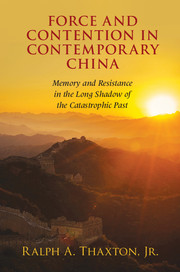 Force and Contention in Contemporary China
Force and Contention in Contemporary China Published online by Cambridge University Press: 05 August 2016
At the turn of the twenty-first century, the central problem facing Da Fo villagers was political corruption. Hu Jintao, the chairman of the Chinese Communist Party (CCP), visited Xibaipo village in Hebei province in December 2002, where he gave a passionate speech about the critical urgency of fighting corruption in China. According to one report, Hu subsequently stated in a special emergency meeting of the Politburo: “It is not a few local governments, but most of the local governments; it is not a few officials, but most of the officials who are corrupt and suppressing people with state power. Are they not forcing the people to rise up to overthrow the Communist Party?” In Origins of the Chinese Revolution, Lucien Bianco reminds us that corruption – not simply social misery and the destabilizing consequences of the Japanese invasion – proved fatal to the Nationalist government.
Some Da Fo farmers, including those who had supported Mao's pre-1949 insurgency, said the fate of the corrupt Communist Party would be the same as that of the Kuomintang. Worried about this possibility, and using corruption as a pretext to put his own clients in key positions, in 2013 Xi Jinping kicked off his presidency with a vow to pull out all stops in fighting official corruption. The ensuing offensive, reminiscent of Mao-era anticorruption campaigns, was orchestrated to present the supreme leader of the Communist Party as a man of the people and, according to Andrew Wedeman, to “build legitimacy.”
Building legitimacy through campaigns that did little to actually change the corrupt habits of Mao-era rule was difficult, however. Beijing's failure to institute such change is an important reason why the post-Mao period, including the reign of Deng Xiaoping, saw an explosion of popular resistance to corruption. In the Liangmen township–Da Fo village area, this resistance was charged by memories of Communist Party rule in Mao's great famine. It seems that there was nothing like the outbreak of Deng-era corruption, and resistance to it, at play locally in the initial phase of post-Stalinist USSR politics. Why the difference? For one thing, Nikita Khrushchev apparently ran a very tight ship. His party – and the KGB – relied on internal administration to regulate official corruption.
To save this book to your Kindle, first ensure no-reply@cambridge.org is added to your Approved Personal Document E-mail List under your Personal Document Settings on the Manage Your Content and Devices page of your Amazon account. Then enter the ‘name’ part of your Kindle email address below. Find out more about saving to your Kindle.
Note you can select to save to either the @free.kindle.com or @kindle.com variations. ‘@free.kindle.com’ emails are free but can only be saved to your device when it is connected to wi-fi. ‘@kindle.com’ emails can be delivered even when you are not connected to wi-fi, but note that service fees apply.
Find out more about the Kindle Personal Document Service.
To save content items to your account, please confirm that you agree to abide by our usage policies. If this is the first time you use this feature, you will be asked to authorise Cambridge Core to connect with your account. Find out more about saving content to Dropbox.
To save content items to your account, please confirm that you agree to abide by our usage policies. If this is the first time you use this feature, you will be asked to authorise Cambridge Core to connect with your account. Find out more about saving content to Google Drive.